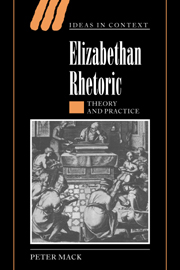Book contents
- Frontmatter
- Contents
- Acknowledgements
- Introduction
- 1 Rhetoric in the grammar school
- 2 Rhetoric and dialectic at Oxford and Cambridge
- 3 English-language manuals of rhetoric and dialectic
- 4 Everyday writing: notebooks, letters, narratives
- 5 Histories, conduct manuals, romances
- 6 Political argument
- 7 Elizabethan parliamentary oratory
- 8 Religious discourse
- Conclusion
- Bibliography
- Index of rhetorical and dialectical terms
- General index
- IDEAS IN CONTEXT
Introduction
Published online by Cambridge University Press: 22 September 2009
- Frontmatter
- Contents
- Acknowledgements
- Introduction
- 1 Rhetoric in the grammar school
- 2 Rhetoric and dialectic at Oxford and Cambridge
- 3 English-language manuals of rhetoric and dialectic
- 4 Everyday writing: notebooks, letters, narratives
- 5 Histories, conduct manuals, romances
- 6 Political argument
- 7 Elizabethan parliamentary oratory
- 8 Religious discourse
- Conclusion
- Bibliography
- Index of rhetorical and dialectical terms
- General index
- IDEAS IN CONTEXT
Summary
In 1576 when Peter Wentworth delivered his most aggressive attack on the Queen's management of parliament he chose to begin with a general defence of liberty of speech, modelled on the chreia, one of the grammar school composition exercises.
Mr Speaker, I find written in a little volume these words in effect, ‘Sweet indeed is the name of libertye and the thing it selfe a value beyond all inestimable treasure'; soe much the more it behoveth us to take heed least we, contenting our selves with the sweetness of the name onely, doe not lose and forgoe the value of the thing: and the greatest value that can come unto this noble realme by the inestimable treasure is the use of it in this House, for unto it it is due.
Wentworth's initial quotation is adapted from ‘Libertate nihil dulcius’ from the grammar school textbook Sententiae pueriles, perhaps by association with Cicero's ‘O nomen dulce libertatis’ (In Verrem, v.163) and the English proverb ‘Liberty is worth more than gold’. He elaborates the second half of his first sentence from the key words of his text (‘sweetness’, ‘name’, ‘value’, ‘thing’, ‘inestimable treasure’). Wentworth goes on to list the ‘commodityes’ of free speech before describing the impediments to freedom of speech he has witnessed in the House.
- Type
- Chapter
- Information
- Elizabethan RhetoricTheory and Practice, pp. 1 - 10Publisher: Cambridge University PressPrint publication year: 2002



